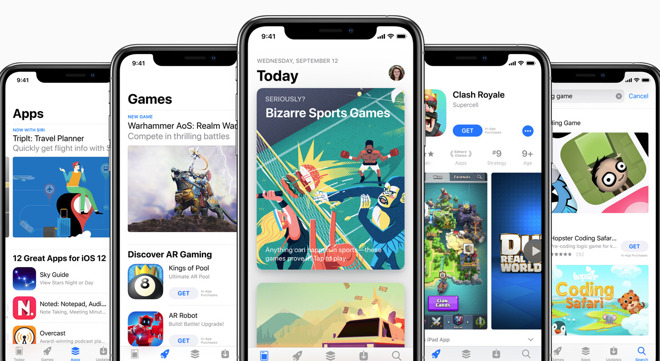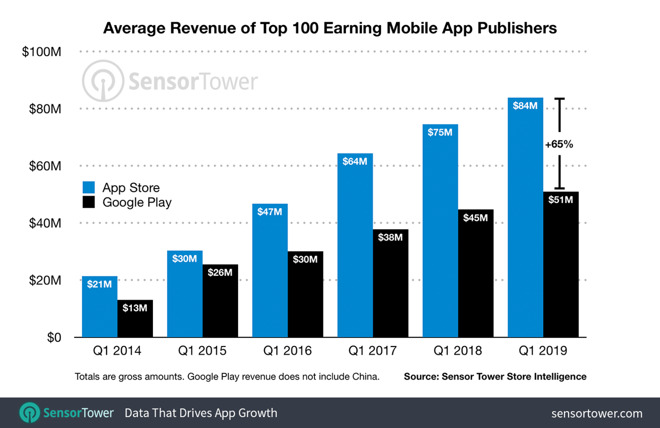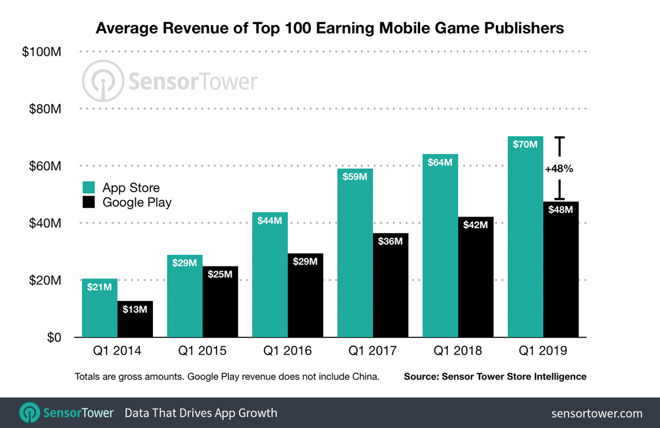App Store continues to vastly outpace Google Play in consumer spending
Publishers behind the biggest apps in the App Store are earning considerably more from Apple's virtual storefront than from Google Play, Sensor Tower estimates suggest, with iOS apps bringing in 64% more revenue than Android counterparts.

Analysis into quarterly spending in apps for the top 100 publishers in the App Store and Google Play by Sensor Tower's Store Intelligence claims the firms generated a combined average of $130.4 million in consumer spending for the first quarter of 2019. The data also indicates the average gross income for the publishers was $83.8 million from App Store sales, while the Google Play equivalent was $51 million in the period.
Further analysis of the first quarters of 2014 until 2019 also indicates a compound annual growth rate of about 31% throughout the period, with the App Store slightly better than Google Play again with 31.3% and 31.2% respectively. In the five-year period, the App Store's average revenue for the top apps grew 291%, whereas Google Play apps saw a 289% increase.

Looking at specific types of apps, the non-gaming revenue sees a far greater disparity between the stores, with the average spend in the App Store for top non-gaming apps hitting $23.3 million, 232% larger than the $7 million average calculated for Google Play apps in the quarter.
The disparity is also growing, with the compound annual growth rate for the App Store reported at 56.1% for the apps, against 50.9% for Google Play, over the five-year reporting period. However, in 2019, Google Play saw an increase of 44.4% against the App Store's 30.5 percent, suggesting consumers may be more prepared to spend on Android than they had previously.
Gaming, the main revenue generator, has a far smaller disparity between the stores. While the App Store is still in the lead, with gaming spend averages for the top 100 publishers being at $70 million for Q1 2019, it is only leading Google Play by just 48% with earnings of $48 million.

The compound annual rates are reversed over the five-year period, with Google Play growing slightly faster at 30.2% against the App Store's 27.9% growth. The average top 100 game publisher made 12.6% more year-on-year for Q1 2019 on Google Play, while the App Store equivalents saw 9.8% growth.
Sensor Tower advises the revenue totals are for gross amounts. The data also doesn't include revenue figures for Google Play in China, which may affect the results.
In an earlier report in October, the analytics firm reported the App Store earned nearly 93% more in consumer spending than Google Play during Q3 2018. The App Store generated 12 billion in revenue during the period, a 23.3% increase over the same quarter in 2017, while Google Play's $6.2 billion was an increase over the same time period of 21.5%.

Analysis into quarterly spending in apps for the top 100 publishers in the App Store and Google Play by Sensor Tower's Store Intelligence claims the firms generated a combined average of $130.4 million in consumer spending for the first quarter of 2019. The data also indicates the average gross income for the publishers was $83.8 million from App Store sales, while the Google Play equivalent was $51 million in the period.
Further analysis of the first quarters of 2014 until 2019 also indicates a compound annual growth rate of about 31% throughout the period, with the App Store slightly better than Google Play again with 31.3% and 31.2% respectively. In the five-year period, the App Store's average revenue for the top apps grew 291%, whereas Google Play apps saw a 289% increase.

Looking at specific types of apps, the non-gaming revenue sees a far greater disparity between the stores, with the average spend in the App Store for top non-gaming apps hitting $23.3 million, 232% larger than the $7 million average calculated for Google Play apps in the quarter.
The disparity is also growing, with the compound annual growth rate for the App Store reported at 56.1% for the apps, against 50.9% for Google Play, over the five-year reporting period. However, in 2019, Google Play saw an increase of 44.4% against the App Store's 30.5 percent, suggesting consumers may be more prepared to spend on Android than they had previously.
Gaming, the main revenue generator, has a far smaller disparity between the stores. While the App Store is still in the lead, with gaming spend averages for the top 100 publishers being at $70 million for Q1 2019, it is only leading Google Play by just 48% with earnings of $48 million.

The compound annual rates are reversed over the five-year period, with Google Play growing slightly faster at 30.2% against the App Store's 27.9% growth. The average top 100 game publisher made 12.6% more year-on-year for Q1 2019 on Google Play, while the App Store equivalents saw 9.8% growth.
Sensor Tower advises the revenue totals are for gross amounts. The data also doesn't include revenue figures for Google Play in China, which may affect the results.
In an earlier report in October, the analytics firm reported the App Store earned nearly 93% more in consumer spending than Google Play during Q3 2018. The App Store generated 12 billion in revenue during the period, a 23.3% increase over the same quarter in 2017, while Google Play's $6.2 billion was an increase over the same time period of 21.5%.

Comments
Oh, the good old days!
"Android users saves tens of millions of dollars on apps compared to iPhone users"
"The most popular app developers, Google, Facebook, Microsoft, Twitter, earn hundreds of millions of dollars on Android without charging customers a dime"
please explain.
Android users save tens of millions of dollars by using 3 companies that provide free apps/services for BOTH operating systems, and 1 that charges the same for its office suite on both platforms?
If you seriously think that developers make the exact same apps- free on Android, & for a fee on iOS.... you’re tripping!
Those tens of billions are spent on apps that users find value in. I bet the developers are grateful that Apple didn’t foster an environment where the end user thought is: “I’m letting them track me and advertise to me... literally everything should be free! I’ll never pay for a single app as long as I live”.
Before you can comment accurately you first have to understand what you're even commenting about. The factual takeaway is that Apple makes more revenue from their App Store than Google does from theirs. That's a fact. Zero dispute.
Extending that to "all of Android" isn't necessarily so, and probably isn't IMHO.
https://buildfire.com/mobile-app-stores-list/
Look at it this way. Compare the App Store to the Play Store. There are essentially 2 large markets (China and US), 1 secondary market (Europe), and the rest.
The App Store serves the largest market share (by default in China since the Play Store doesn't serve it at all) in both of the large markets - China and the US. The Play Store only serves one of those markets (the US) AND serves the smaller market share in the in it. Play Store also serves a larger group in Europe and the rest, but they pale compared to the 2 big boys.
tl;dr Math says as long as the market conditions remain the same, the Play Store will never equal the revenue of the App Store. The App Store serves a far larger group of customers than the Play Store.
There's too many Android appstore alternatives and Google Play lacks access to 100's of millions of Android handsets in regions they don't service. They'll still manage several $Billions in profit but certainly not as much as Apple.
As for writing off other Android appstores you honestly want to claim 750M+ Chinese users of Android devices don't matter, the app stores servicing them "irrelevant"? Seriously? LOL!
There's sources with data showing Google can sell to less than half the Android install base with the majority of "Android" devices in regions that Google Play does not service. In general there are NO regions selling iOS devices that Apple cannot service are there?
On a per user basis i have zero doubt you are correct about the potential app revenue. As an OS platform I think you might be wrong.